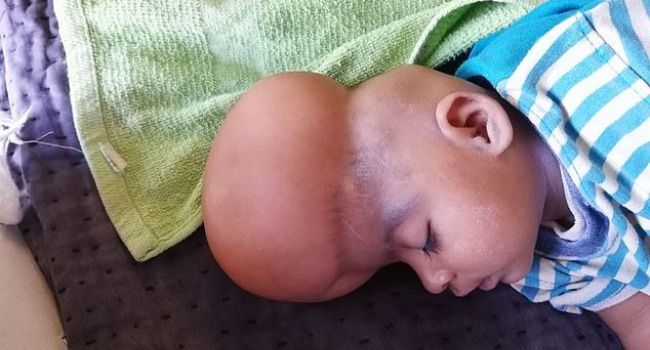- Latest news▼
-
19:41, April 25 Children’s Hospital Los Angeles and International Center of Professional Development Allergy/Immunology Conference

-
17:31, April 25 JAMA: patient grew long, curly eyelashes because of chemotherapy

-
11:08, April 25 Mpox epidemic declared in Republic of the Congo

-
08:31, April 25 OU: quitting smoking 4 times more likely to cure laryngeal cancer

-
01:20, April 25 Paralyzed man in China writes hieroglyphs using neural implants placed in his brain

-
15:11, April 24 Zombie deer disease possibly linked to hunters’ deaths

-
12:27, April 23 Appetite: Scientists found out the secret to the appeal of large portions of fast food

-
10:33, April 23 Scientists test new approach to fighting viruses

-
08:38, April 23 Ketamine may help with postpartum depression

-
22:12, April 22 Unhealthy amount of sugar found in baby food products of a well-known brand

-
19:41, April 22 Air pollution puts health of more than 1.6 billion workers globally at risk

-
17:25, April 22 Scientists found baked goods and lack of sleep to be more dangerous than alcohol

-
16:02, April 22 342 cases of measles recorded in Armenia so far in 2024

-
15:29, April 22 BrainStimulation: electrical brain stimulation alleviates anxiety and depression in the elderly

-
08:27, April 22 Cognitively stimulating jobs in midlife could lower dementia risk in old age, study finds

All materials
Pakistani baby is born with an abnormal bulge on top of her head that is pushing her BRAIN out of her skull

A Pakistani baby girl who was born with an abnormal bulge on the top of her head is desperately waiting for life-changing surgery.
Anila Ali, from Dokri in the Sindh province of Pakistan, was born with an unusually large, soft head, which doctors diagnosed as a severe form of craniosynostosis.
This is thought to be causing pressure to build inside the three-month-old's head, which is forcing her brain to spread outside of her skull.
Medics are baffled as to how to treat the newborn, who also suffers from a severe form of spina bifida, which they claim has caused a tumour to develop on her back.
Anila's 19-year-old mother Naushaba, said: 'I was happy when I gave birth to Anila, my first child, three months ago in a private clinic.
'But, I got afraid when I first saw her head.
'Her head was not developed properly and doctors told us to take her to the children hospital in Larkana.
'Her head was so soft that doctors told us that even a small injury on her head can do her a lot of damage.'
Naushaba and her husband Amad Ali, 21, took Anila to Larkana where doctors then advised them to take her to Jinnah Post Graduate Medical Centre in Karachi.
Unable to afford to make the 270-mile (430km) journey, the couple's friends and family gave them £800 to cover the cost of their travel and stay in Karachi.
Amad, who earns just £4 a day as a daily wage labourer, said: 'We took a lot of loans to arrange a visit and stay in Karachi.
'I wish our daughter gets the right treatment here.'
As well as crainosynotosis, Anila also suffers from myelomeningocele, which is considered the most dangerous form of spina bifida.
This occurs when a baby's spine and spinal cord do not form or close properly in the womb.
Professor Raza Rizvi, head of neurosurgery at Karachi's Jinnah Post Graduate Medical Centre, said: 'The patient [was] admitted [to] our hospital and we are monitoring her.
'Anila has crainosynotosis. Her brain is spread out of her skull. She also suffers from myelomeningocele'.
Professor Rizvi claims Anila's myelomeningocele has caused a 'small tumour' to develop on her back.
This can occur if the spinal cord and its nerves become tangled in a benign fatty growth.
'We will start by operating [on] her for myelomeningocele and we are yet to decide on how we will proceed with her skull surgery,' Professor Rizvi said.
'A brain reconstructive surgery is possible but that could be very risky as the patient is very young.'
Complications of the surgery may include stroke, seizures, nerve damage and spinal fluid leakage.




Follow NEWS.am Medicine on Facebook and Twitter
- Video
- Event calendar
- Children’s Hospital Los Angeles and International Center of Professional Development Allergy/Immunology Conference
- First Armenian-German Conference entitled “Heart Failure Spring School”
- Allogeneic bone marrow transplant in case of hematological malignancy performed in Armenia for first time
All materials
- Archive
- Most read
month
week
day
- JAMA Oncology: Urine test can help rule out high-grade prostate cancer with almost 100% accuracy, study shows 1294
- Scientists grow human mini-lungs in lab 1175
- Next pandemic likely to be triggered by flu - scientists 943
- Scientists found baked goods and lack of sleep to be more dangerous than alcohol 919
- 342 cases of measles recorded in Armenia so far in 2024 870
- Scientists develop new method to safely stimulate immune cells to fight cancer 783
- Cognitively stimulating jobs in midlife could lower dementia risk in old age, study finds 781
- Blood test can determine who is at risk of developing multiple sclerosis - scientists 781
- BrainStimulation: electrical brain stimulation alleviates anxiety and depression in the elderly 721
- Ketamine may help with postpartum depression 654
- Unhealthy amount of sugar found in baby food products of a well-known brand 649
- Appetite: Scientists found out the secret to the appeal of large portions of fast food 646
- Air pollution puts health of more than 1.6 billion workers globally at risk 645
- Scientists test new approach to fighting viruses 631
- Zombie deer disease possibly linked to hunters’ deaths 538
- Find us on Facebook
- Poll





